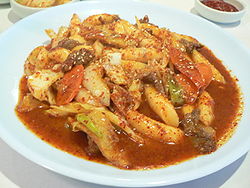Cooking and carcinogens
In a human epidemiological analysis by Richard Doll and Richard Peto in 1981, diet was estimated to cause perhaps around 35% of cancers.[20] Some of these cancers may be caused by carcinogens in food generated during cooking process, although it is often difficult to identify the specific components in diet that serve to increase cancer risk. Many food, such as beef steak and broccoli, contain low concentrations of both carcinogens and anticarcinogens.[21] Several studies published since 1990 indicate that cooking meat at high temperature creates heterocyclic amines (HCAs), which are thought to increase cancer risk in humans. Researchers at the National Cancer Institute found that human subjects who ate beef rare or medium-rare had less than one third the risk of stomach cancer than those who ate beef medium-well or well-done.[22] While eating meat raw may be the only way to avoid HCAs fully, the National Cancer Institute states that cooking meat below 212 °F (100 °C) creates "negligible amounts" of HCAs. Also, microwaving meat before cooking may reduce HCAs by 90%.[22] Nitrosamines, present in processed and cooked foods, have also been noted as being carcinogenic, being linked to colon cancer. Research has shown that grilling, barbecuing and smoking meat and fish increases levels of carcinogenic Polycyclic aromatic hydrocarbons (PAH). In Europe, grilled meat and smoked fish generally only contribute a small proportion of dietary PAH intake since they are a minor component of diet – most intake comes from cereals, oils and fats.[23] However, in the US, grilled/barbecued meat is the second highest contributor of the mean daily intake of benzo[a]pyrene at 21% after ‘bread, cereal and grain’ at 29%.[23] Baking, grilling or broiling food, especially starchy foods, until a toasted crust is formed generates significant concentrations of acrylamide, a possible carcinogen

An anticarcinogen is any chemical which reduces the occurrence of cancers, reduces the severity of cancers that do occur, or acts against cancers that do occur, based on evidence from in vitro studies, animal models, epidemiological studies and/or clinical studies. Preventative anticarcinogens act by enhancing an organism's natural defenses against cancer, by deactivating carcinogens or by blocking the mechanisms by which carcinogens act (such as free radical damage to DNA). Anticarcinoma agents participate in the selective destruction of cancer cells, or inhibit the growth and proliferation of cancer cells. See also: Chemotherapy. Interest in preventative anticarcinogens is motivated primarily by the principle that it is preferable to prevent disease where possible, and that positive actions can be effective as well as negative ones (such as reducing exposure to known carcinogens). Anticarcinoma agents that do not have significant negative side effects have a similar potential role, by reducing the seriousness of any cancers that do occur. [edit]Known anticarcinogens There is epidemiological evidence that a diet rich in antioxidant vitamins and flavonoids is anticarcinogenic. Interest in many popular nutritional supplements, including essential antioxidant nutrients such as selenium compounds and hormones such as melatonin and DHEA, is partly motivated by evidence that these have significant anticarcinogenic effects in appropriate quantities. The major psychoactive component in marijuana, tetrahydrocannabinol, has been shown to have anticarcinogenic activity, when injected into mice.[1] The other major component of cannabis - cannabidiol, has also been shown to inhibit cancer cell growth, with low potency in non-cancer cells. Although the inhibitory mechanism is not yet fully understood, Ligresti et al. suggest that "cannabidiol exerts its effects on these cells through a combination of mechanisms that include either direct or indirect activation of CB2 and TRPV1 receptors, and induction of oxidative stress, all contributing to induce apoptosis.